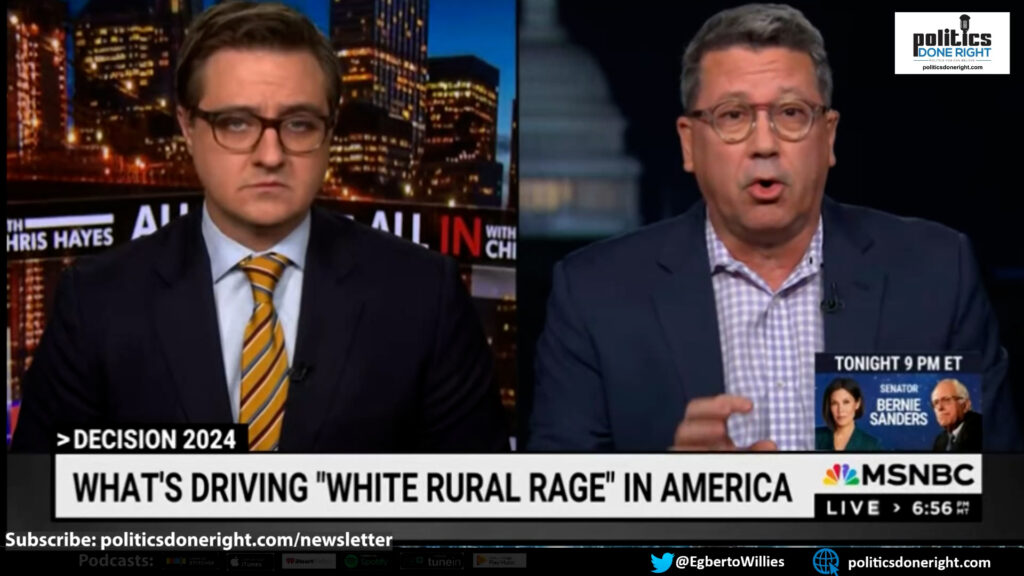Rural America is one of the GOP’s biggest supporters. The inconvenient truth is that the policies Democrats promote are the ones that make their lives easier and worthwhile.
Rural America does better under Democrats.
Podcasts (Video — Audio)
In the heart of Rural America, amidst its sprawling fields and vibrant communities, a narrative of economic angst and disillusionment with the political system prevails. This sentiment, as captured in discussions led by Chris Hayes and amplified by guests like political scientist Tom Schaller, who co-authored the book “White Rural Rage” with journalist Paul Waldman, highlights a pressing issue: the policies and candidates that have historically dictated the economic and social landscape of these regions may not align with the best interests of their inhabitants. The conversation pivots around the central thesis that Democratic policies and candidates, contrary to the prevailing voting trends in these areas, offer a more beneficial path forward for rural Americans.
At the core of this discourse is the recognition of a profound economic dislocation experienced by many in rural areas, exacerbated by policies that favor the automation of industries, the outsourcing of jobs, and a capitalist model prioritizing shareholder profits over community welfare. These phenomena, often associated with Republican policies, have contributed to the closure of local hospitals, the disappearance of jobs, and the decline of small businesses, replaced increasingly by chain dollar stores—a stark emblem of late-stage capitalism’s encroachment into these communities. Yet, paradoxically, rural voters frequently elect representatives championing the policies underpinning their economic hardships.
The shift in Rural America’s political landscape over recent years is striking, with areas that once leaned Democratic now showing overwhelming support for Republican candidates. As Schaller suggests, this transition is not merely a reflection of economic grievances but also a response to cultural and social issues, propelled by a sense of alienation and a belief that neither party can adequately address their economic needs. Thus, many rural voters prioritize issues of identity and values, such as gun rights and religious freedoms, in their electoral decisions—a rationale that, while understandable, overlooks the potential for substantive economic and social policy interventions that could improve their lives.
The discussion, however, does not end with a critique of Republican policies or the strategic errors of rural voters. Instead, it turns towards a constructive examination of how Democratic policies, particularly under the Obama and Biden administrations, have sought to address the very concerns that plague Rural America. From significantly reducing the uninsured rate through the Affordable Care Act to targeted investments aimed at revitalizing rural economies and healthcare systems, Democratic policies have demonstrated a commitment to enhancing the welfare of rural communities. Moreover, the Biden administration’s efforts to combat COVID-19 and its economic fallout further illustrate the tangible benefits of Democratic governance for rural areas.
Yet, the challenge remains: how to effectively communicate and implement these policies in a way that resonates with rural voters, transcending cultural and ideological divides. The answer, perhaps, lies in a more nuanced and empathetic approach to political engagement—one that acknowledges the legitimate grievances of rural Americans while offering concrete, practical solutions that address their economic and social needs. This entails not only a reevaluation of the Democratic party’s messaging and outreach strategies but also a deeper, more sustained engagement with rural communities, listening to their concerns and working collaboratively to build a more inclusive and prosperous future.
The assertion that Democratic policies would better serve Rural America and its candidates is not merely an ideological stance but a pragmatic recognition of the tangible benefits these policies have delivered—and can continue to deliver—to these communities. By focusing on rural Americans’ economic and social well-being and crafting policies that directly address their needs, Democrats can forge a new path forward that uplifts all Americans, regardless of where they live or whom they have traditionally supported. This is not only a political imperative but a moral one, ensuring that the voices of Rural America are heard, their concerns addressed, and their communities revitalized for generations to come.
We work extremely hard to research and seed the internet with truthful, fact-based information to counter the misinformation from the Right and others who would have us vote against our interests. Corporations and billionaires ensure the Right-Wing & MAGA are well funded. We have you, our grassroots. Please support us today.
Make a one-time donation
Make a monthly donation
Make a yearly donation
Choose an amount
Or enter a custom amount.
Your contribution is appreciated.
Your contribution is appreciated.
Your contribution is appreciated.
DonateDonate monthlyDonate yearly
